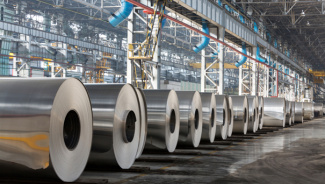Q&A: Trump Tariffs Invite Higher Costs, Risk of Trade War, Says Ross Professor

Related Commentary by Handley on CNBC.com
President Donald Trump said he plans to impose sweeping tariffs of 25 percent on imported steel and 10 percent on all imported aluminum. The president argues other countries disregard trade rules and that steel production is a national security issue. But policy makers fear the tariffs will raise costs for U.S. consumers and spark retaliation on U.S. goods by other countries.
Michigan Ross Professor Kyle Handley explains the implications of these proposed tariffs in this Q&A. Handley notes that retaliation from other countries is a concern, and that many jobs in the steel and aluminum industries were lost to automation, not trade policy. He says “the idea that we are going to bring these industries and jobs back to their former glory is a false promise.”

What repercussions would these tariffs have if they were to go into effect as proposed?
Handley: Most traditional manufacturing industries in the U.S. use imported steel and aluminum as an intermediate input. This includes major employers in the automotive and aviation industries. They will face higher costs and either pass the costs along to consumers through higher prices, absorb the costs in diminished profits, or hold down wages and employment of workers in their own industry.
The shorter- to medium-term risk is that U.S. trade partners will retaliate against other sectors of the U.S. economy. Sorghum farmers in the Midwest may suddenly find the Chinese market is closed to their exports. In the past U.S. presidents have exempted trade partners that have free trade agreements with the U.S., such as Canada and Mexico, from targeted tariffs of this nature. This is more than just courtesy. Partners in free trade agreements have made numerous tariff concessions and reciprocal commitments to keep protection low on a permanent basis. This stability and predictability facilitates investment and hiring.
That’s why President Trump undermines the credibility and effectiveness of these agreements every time he threatens to leave NAFTA or disregards both the letter and spirit of trade agreements that were negotiated in good faith by previous administrations and approved by Congress. If these actions are challenged successfully at the World Trade Organization and lead to the approval of targeted retaliation, the president may simply ignore the rulings and further undermine and damage international institutions.
Is there any upside at all to these tariffs?
Handley: These tariffs are a very blunt instrument to help the aluminum and steel industries. At best, they may save some jobs and possibly raise wages in these industries. But the idea that we are going to bring these industries and jobs back to their former glory is a false promise.
One big issue with trade liberalization is that the gains are distributed fairly broadly to everyone. We all save a few dollars on children's toys and a couple hundred bucks on TVs and cars. But the losses are concentrated with the workers that lose their jobs and can’t find work opportunities in the same profession or in the sectors of the economy that do experience gains. Even if I can provide evidence, using an economic model and statistical estimates that we are better off overall, that doesn't matter to the person that lost their job.
The latest tariffs do not resolve the tension between who gains and who loses. Commerce Secretary Wilbur Ross is arguing this amounts to a few cents of added costs per soup or beer can and 1 percent to the cost of a car. He’s ignoring the scale of increased costs and potential job losses or wage pressure in industries that produce hundreds of millions of cans and millions of cars per year. In effect, he and the president are endorsing distributed losses to everyone and concentrated gains for steel and aluminum. A strong economic argument supporting this tradeoff hasn't been made.
Would different tariffs or a different strategy altogether better accomplish the president’s goals?
Handley: If President Trump wanted to create the appearance of “doing something,” then the job is done. The national security rationale is just a ruse to create a false sense of importance. Displaced workers in the steel, aluminum, or other industries affected by trade could have been provided with other forms of assistance for retraining and relocation. Many of these workers were not even displaced by trade, but rather by automation. We cannot reverse the technological progress and we should not operate on any assumption that things will ever go back to the way they were because of these new trade barriers.
Related articles:
Commentary by Kyle Handley on CNBC.com: Here's the Real Economic Damage From Trump's Trade 'Cold War'Opens a new window
Paper by Kyle Handley and coauthors on CEPR's Vox blog: Trade Cold Wars and the Value of Agreements During CrisesOpens a new window
Media Contact: michiganrosspr@umich.edu







